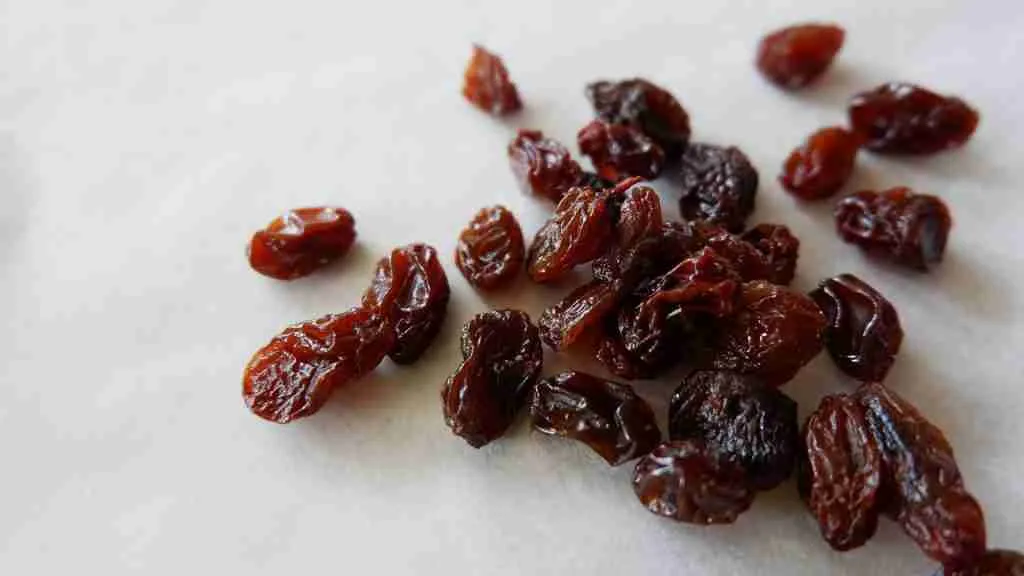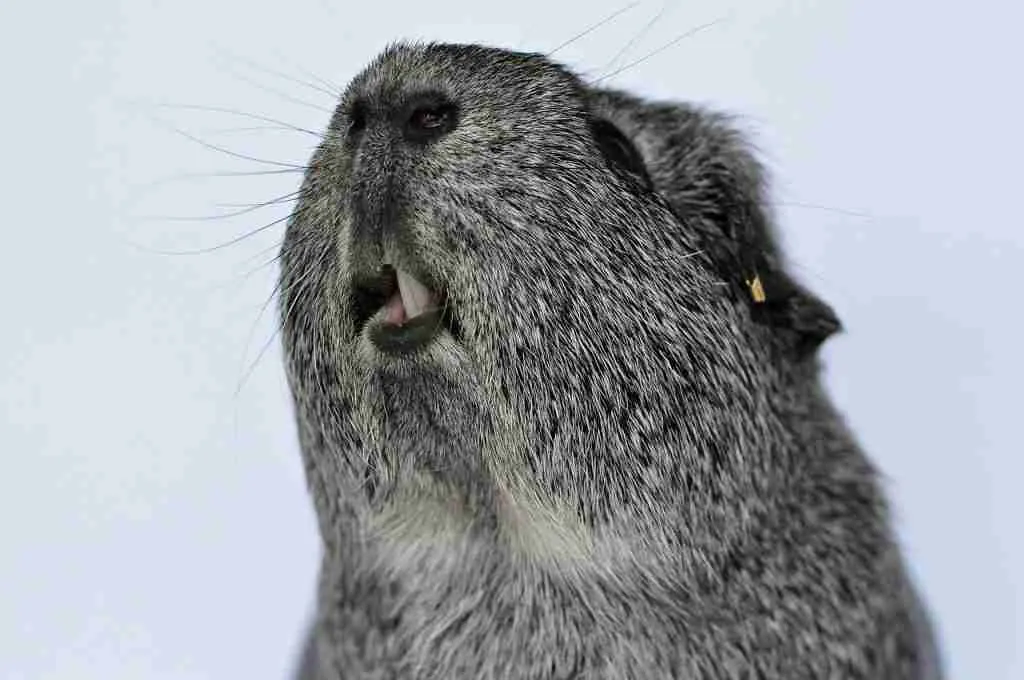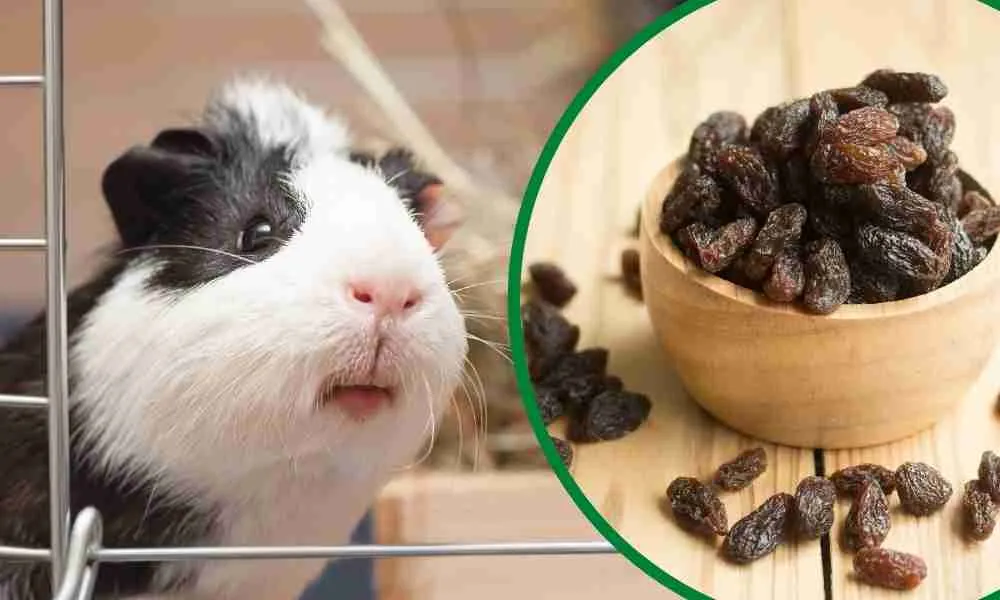Generally, raisins are grapes that have been dried in the sun or in a food dehydrator. They are often used as toppings on cereals, ice cream, and other desserts.
Despite their sweet taste and health benefits for humans, can you actually feed your guinea pigs eat raisins?
Yes, guinea pigs can eat raisins. However, I don’t recommended it to your cavies regularly. Raisins contain lots of sugar which can cause stomach problems in your small pets. Also, this dried fruit is very small and may get stuck in your pet’s throat if they try to swallow it.
Therefor, it is best you avoid giving your cavies these fruit snacks or only feed them a little once in a while.
Now, I hope you know that feeding your guinea pigs raisins can be harmful to them. It is better to be safe than sorry! Come to think of it, what are the main reasons why raisins are not good for guinea pigs?
Just keep reading as we answer this question and others in this article.
Table of Contents
Why Are Raisins Not Good for Guinea Pigs?

One major reason you should avoid feeding your cavies excess raisins is that they will not be able to digest it well. When these small pets eat diets with too much sugar, serious digestive problems, and other health issues, which we will discuss later, will happen.
Naturally, your guinea pigs’ digestive system can only digest fresh fruits and vegetables, being herbivores. Raisins, as you know, are processed grapes, which means they are not fresh fruits.
You’ll be exposing your cavies to unpleasant symptoms when you serve them these dried fruits in excess quantity.
Risk in Feeding Raisins to Your Guinea Pigs
Guinea pigs have sensitive stomachs that easily react to strange diets. Consider the risk factors below before feeding them the dried fruits.
Choking Hazard
Due to its dryness, raisins are sticky and can become hard to swallow for your tiny pets. Moreover, the dry fruit is very small and can get stuck in your guinea pig’s throat. There’s a chance that your guinea pigs will choke on raisins while they are eating it.
Understand that these small creatures need diets that will be easy to chew to wear down their teeth growth, not the ones that will stick to it.
Sudden Weight Gain
Sugar, which is too much in raisins, can cause weight gain in guinea pigs. Mostly, dry fruits contain lots of sugars as a result of absorbing fluids. Quick weight gain in your tiny pets can expose them to the risk of obesity and diabetes.
Urinary Problem
Calcium is a nutrient in raisins that is useful for building strong bones and teeth. However, excess calcium from eating too many raisins can cause liver and kidney stones in your guinea pigs. Also, too much calcium in your cavies’ diet can expose them to the risk of having painful urination, urinating blood, and urinary infections.
Indigestion
Another risk your guinea pigs can get exposed to is indigestion and upset stomach. Like we mentioned earlier, your tiny pets cannot digest too much sugar. Since raisins contain too much sugar, they can cause cramps, stomach pain, and watery stool in guinea pigs when they eat too much of it.
Nutritional Value of Raisins
Let’s take a look at the main nutrients in 100 g of raisins:
| Magnesium | 8% |
| Calcium | 5% |
| Iron | 10% |
| Carbohydrates | 79.2 g |
| Proteins | 3.1 g |
| Calories | 299 kcal |
| Vitamin C | 2.3 mg |
| Sugar | 59.2 g |
| Zinc | 0.22 mg |
| Fiber | 3.7 g |
| Potassium | 749 mg |
| Vitamin E | 0.12 mg |
| Manganese | 0.229 mg |
| Copper | 0.318 mg |
| Vitamin B6 | 0.017 mg |
| Phosphorous | 101 mg |
| Vitamin K | 3.5 mcg |
| Folates | 5 mcg |
| Niacin | 0.766 mg |
| Fats | 0.5 g |
Benefits of Feeding Guinea Pigs Raisins
Consider serving your guinea pigs small raisins occasionally as it contains some health benefits. However, if you’re not careful while feeding them the dried grapes, there will be a problem.
Below are the health benefits that your guinea pigs can get from eating raisins:
Prevents Scurvy
Vitamin C is one of the nutrients in raisins. It is useful for preventing scurvy, a serious disease that causes diarrhea, bleeding, loss of appetite, and other symptoms, in guinea pigs.
Since your cavies cannot produce this important nutrient, giving them little raisins is not a bad idea.
Prevents Certain Diseases
Raisins are packed with manganese, an active antioxidant that removes free radicals in the body of guinea pigs. Naturally, body metabolism in your cavies produces free radicals.
If these substances are not removed from the bloodstream, they can cause certain diseases including cancer.
Diets that are rich in antioxidants like manganese help to get rid of these free radicals thereby preventing diseases. In addition, manganese in raisins can also reduce inflammation in guinea pigs and control their blood pressure.
Helps in Digestion
Another important nutrient found in raisins is fiber. It allows easy and fast digestion of food and easy bowel movement in your cavies. So, if your guinea pigs are having digestive problems, diets rich in fiber are the solution.
Improves Blood Health
Raisins also contain iron and copper, which play a key role in maintaining healthy blood. Copper helps in the formation of red blood cells and prevents heart diseases. Both nutrients can help prevent anemia in your pets.
Builds Strong Bones and Teeth

Calcium is an important mineral that is found in raisins. It helps to build strong bones and teeth, especially in baby guinea pigs. But as they get older, you should reduce the amount of calcium you feed your cavies – it can cause urinary problems.
Lowers Cholesterol Levels
Niacin, a nutrient useful for lowering cholesterol levels in the bloodstream, is also in raisins. Besides this, niacin prevents cardiovascular diseases, diabetes, and other diseases that can happen as a result of high cholesterol levels in guinea pigs.
Boosts Immunity
One other important nutrient in raisins is zinc. It is a major property that helps to build the immune system of guinea pigs. Moreover, zinc ensures fast healing of wounds in cavies. Perfect immunity and quick wound healing are both important for preventing infections in your pets.
What Are Other Alternatives for Raisins
Besides raisins, there are other delicious and healthy fruits you can feed your cavies. Here are some of them:
| Apple | Apricot | Banana | Strawberry | Cherries |
| Cranberries | Grapes | Kiwi fruit | Melon (All types) | Blueberries |
| Tomatoes | Papaya | Peach | Pear | Pineapple |
| Plums | Raspberry | Oranges | Radish | Watermelon |
Final Thoughts
We have now come to the end of this article. But before you go, keep in mind the key points as they will be useful now or in the future.
We have discussed that guinea pigs can eat raisins but only a small amount at a time. Let’s say the dried grape should be like a treat to your small pets, not an everyday diet as it contains too much sugar.
Always remember that moderation is important whenever you want to feed your guinea pigs any diet.
Consider their health before anything else to prevent a constant visit to the vet for treatments. It is not the amount of diet that matters but the benefits it offers to your little furry friends!
Did you find this guide helpful and interesting? Then share with your friends so that they can learn too.
